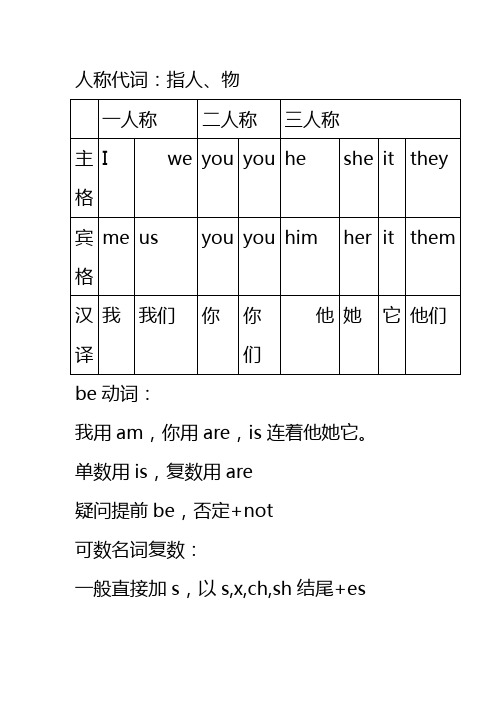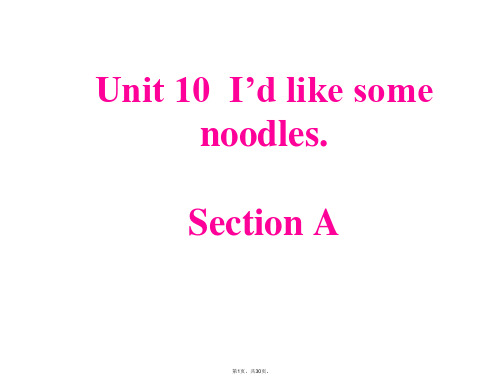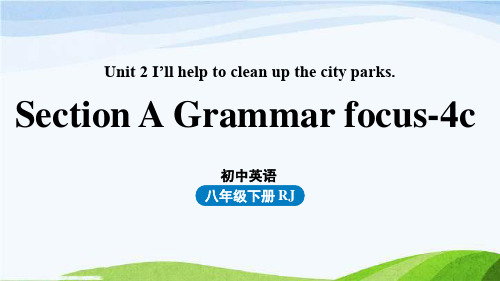grammarI’d+like用法
Module 2 Grammar重点语法形容词的比较级(1)-八年级英语上册单元重难点易错题精练(

班级姓名学号分数Module 2 My home town and my country形容词的比较级(1)(时间:60分钟,满分:100分)一、单项选择(本大题共40小题,每小题2分,共80分)1.Mary wants to buy this notebook. It’s much ________ than that one, but it’s cheaper.A.thick B.thicker C.deep D.deeper2.Diogenes threw away his cup and became even ________.A.happier B.happy C.happiest D.happily3.— Is that Liu Ying?— No, that’s Liu Li. Liu Ying has ________ hair than Liu Li.A.short B.shorter C.shortest D.the shortest4.We all know the earth is ________ than the sun.A.bigger B.the smallest C.the biggest D.smaller5.She is ________ than anyone I know.A.funny B.funnier C.more funny D.funniest6.Some people always want themselves look much ________, so they do something to hide their fool actions. A.smarter B.the smartest C.less smart D.smart7.The busier my father is, ________ he will be.A.happier B.the happier C.the happiest D.happiest8.The place is not big enough for Lucy’s birthday party. We should find a ________ one.A.big B.bigger C.small D.smaller9.I’m ________ heavier than my brother, so I have to do something to lose weight.A.lots B.little C.a little D.few10.It is ________ to practice in winter than in summer because the days are short and the weather is cold. A.harder B.hardest C.hard D.the hardest11.Using mobile phone makes it ________ for us to do our daily work than before.A.easy B.easier C.easily D.more easily12.Lucy is _________ of the two girls.A.tallest B.the taller C.the tallest13.—How do you like the song?—It’s amazing. I have never enjoyed a ________ one before.A.worst B.worse C.best D.better 14.These apples are ________ than before. I’d like to buy some.A.much cheaper B.less cheap C.much cheaply D.less cheaply 15.—Do you think computers are more expensive than they were five years ago?—No, they are ________.A.cheap B.cheaper C.cheapest D.the cheapest 16.The apple juice tastes good, but the orange juice tastes _______ better.A.very B.quite C.much D.pretty 17.The ________ kids learn to be independent, the ________ it is for their future. A.early; good B.early; better C.earlier; better 18.My brother is ________ stronger than before.A.more B.much C.many D.most 19.Frank has changed a lot, he is much ________ because he exercises every day. A.stronger B.strongest C.strong D.the strong 20.— Can’t you walk ________ faster? There’s still a long way to go for us.A.little B.a little of C.a bit D.a bit of 21.—Why don’t you get yourself a job?— That’s ________ said than done.A.easy B.easier C.the easier D.the easiest 22.— How are you today, Henry?— I’m even ________. I don’t think this medicine is right for me.A.worse B.better C.badly D.well 23.Paul passes the ball ________ better this year than last year.A.more B.few C.much D.many 24.________ the mountain is, ________ the air is.A.The highest; the thinnest B.Higher; thinnerC.The higher; the thinner D.The highest; the thinner25.________ he takes the medicine, ________ he can become healthy.A.The earlier; the faster B.Early; fastC.The early; the fast D.Earlier; faster26.The ______ you work at your lessons, the ______ results you will get.A.hard;good B.harder;good C.hard;better D.harder;better27.The population of China is ________ than________ of India.A.more; that B.more; those C.larger; that D.larger; those28.Helen is my _________ sister. She is two years_________ than me.A.elder; older B.older; elder C.old; elder D.elder; elder29.The population of China is than of America.A.larger; that B.more; that C.large; it D.more; it30.—Enjoying fresher air helps make people in Yancheng ________.—I can’t agree with you more, and many travelers come to Yancheng.A.more healthy B.healthier C.more healthily D.healthily31.—China is over 5,000 years old. It’s one of ________ countries in the world.—Yes. It has a much ________ history than most countries.A.the oldest; long B.the oldest; longer C.older; longer D.older; long32.—The cake is too expensive. Would you like to show me a ________ one?—Sure. Here you are.A.cheap B.cheaper C.cheapest D.more cheaper33.Sometimes walking is even ________ than driving during the busy traffic time.A.fast B.faster C.slow D.slower34.I’m surprised that John is only 25. I thought he was___________, for he seems to be in his thirties.A.old B.older C.young D.younger35.He has ___________ arms now and is able to pick the table up with one hand.A.weakest B.weaker C.strongest D.stronger36.We have done much to protect the environment. So the river is getting ___________ than before. A.dirtier B.dirty C.cleaner D.clean37.—The temperature is 30℃ today. I prefer staying in to going out.—It will be ___________ tomorrow. The temperature will reach 35℃.A.colder B.hotter C.hottest38.Mike looks ___________ than Paul, but they are of the same age.A.youngest B.the youngest C.younger D.very young39.Beijing is the capital of China and it is ___________ bigger than many other cities in China.A.little B.few C.some D.much40.Grandma has experienced square dance(广场舞) with neighbors for a month, she looks much ________ now.A.the happiest B.happy C.happier D.happiest 二、用所给单词的正确形式填空(本大题共20小题,每小题1分,共20分) 41.Chinese market is much ________ (huge) than before.42.Her face turned even ________ (pale) after taking some medicine.43.The little girl becomes much ________ (healthy)than before.44.Actions speak _________ (loud) than words. So let’s speak less and do more. 45.Reading books when you are tired can make you even ________ (sleep).46.I can’t believe that the first computer was much ________ (big) than a car. 47.The room became even ________ (noise) after the boys came in.48.In the twin family, Lily is ________ (thin) one, but Lisa can sing ________ (clear). 49.The sun is ________ (big) than the earth.50.After dressing up , the old man is much ___________ (ugly) than before. 51.The little girl is much ____________ (brave) than her elder sister.52.Linda is ____________ (tall) one of the two girls.53.Tina is____________(short) than Jill.54.It's __________ (hot) today than yesterday.55.I'm very fat, but my best friend is a lot _______ (fat) than me.56.He is ___________ (clever) than any other boy in the class.57.In summer, the days get _________ (long) and the nights get shorter.58.—I think the countryside is much ________ (quiet) than the city.— I agree with you.59.It’s much _________ (safe) to go across the road when the traffic lights are green. 60.Do you feel ________ (happy) today than yesterday?参考答案:1.B【解析】句意:玛丽想买这本笔记本。
2023【人教版】七年级英语下册教学课件-第2课时(A Grammar Focus-3c) (8)

谓语动词
可数名词
不可数名词
可数名词单数作主语 时,谓语动词用第三人 称单数形式
不可数名词作主语时, 谓语动词用第三人称 单数形式
翻译在线
1.餐馆里有5个人。 There are five people in the restaurant.
2.金钱很重要,但它不是一切。 Money is very important, but it’s not everything.
I’d like beef noodles, please.
What size would you like?
I’d like a large bowl, please.
Would you like a large bowl?
Is there any meat in the tomato and egg soup?
不能直接使用不定冠词a/an 或具体的数词修饰,表示确 切数量时,要用“冠词/数词 +表示计量单位的名词+of+ 不可数名词”结构可数名词Fra bibliotek不可数名词
可用many, a few, few, some, any, a lot of, lots of 等词(组)修饰
可用much, a little, little, some, any, a lot of, lots of 等词(组)修饰
for breakfast. 4. There aren’t many __fi_s_h_e_s__(fish) in this river.
3a Complete the conversation below.
a. What kind of noodles do you have? b. Oh, a medium bowl, please. c. OK, I’d like the mutton noodles then. d. I’d like some noodles, please. e. What sizes do you have? f. Are there any vegetables in the mutton noodles?
Grammar it的用法

be+介词短语; 介词短语; 介词短语 e.g. It is against the law to do that. 这样做是违法的。 这样做是违法的。 其他类型的谓语 e.g. It gives me great pleasure to see the movie. 观看这部电影让我很高兴。 观看这部电影让我很高兴。
3. 用于强调结构 要强调句子的某一部分, 通常是主语、 要强调句子的某一部分 通常是主语、 状语、宾语, 可以把it当作先行词 当作先行词。 状语、宾语 可以把 当作先行词。 这种句子的结构是: 这种句子的结构是: “It is/was+被强调部分+that/who+
句子的其他部分” 句子的其他部分”。如果强调的是 人,可以用who, whom代替that。
It remains to be seen whether it will do us harm or good. 对我们有好处还是有害处, 对我们有好处还是有害处 还要等着 瞧。 It was clear enough what he meant. 他的意思很清楚。 他的意思很清楚。
2. 作形式宾语。 作形式宾语。 当复合宾语中的宾语是不定式、 当复合宾语中的宾语是不定式、动 名词、宾语从句时 名词、宾语从句时, 往往把宾语放 在它的补足语后面, 而用 作形式宾 在它的补足语后面 而用it 放在宾语补足语之前。 语, 放在宾语补足语之前。 e.g. I think it no use arguing with him. 我认为和他争吵没有用。 我认为和他争吵没有用。
4. 用作人称代词 代替前文提到的事物。 代替前文提到的事物。 e.g. The frog is not a warm-blood animal. It’s a cold-blooded one.
Grammar英语语法

人称代词:指人、物be动词:我用am,你用are,is连着他她它。
单数用is,复数用are疑问提前be,否定+not可数名词复数:一般直接加s,以s,x,ch,sh结尾+eso结尾,有生命+es,无生命+s辅音+y结尾,y变i+esf,fe结尾,f,fe变v+esf,fe结尾,直接加s:giraffe,roof,handkerchief,scarf,golf可数名词有单复数,单数用a/an修饰,不可数名词无复数,常与a+量词+of+u.n. 两者都可用some修饰指示代词:this(这个),that(那个),these (这些),those(那些)所有格:表人:sb+’s表物:of(前后倒置)there be:有地点介词:里面in,上面on,over,under 上下方;between…and两者间,among用于3者间,紧挨next to,附近near,before 后面,in front of在外部前方,in the front of空间内部前方来自from,朝前to,里面穿过是through,表面穿过across,到里面into,到上面onto 一般现在时:表示经常反复、现在状态、客观真理助动词:do,does否定分别don’t,doesn’t 动词单三:一般+s,以s,x,ch,sh,o结尾,词尾+es,辅音+y结尾,y变i+es,have单三是has 一般疑问句把be、情态动词、助动词提前,谓语动词还原特殊疑问句=特殊疑问词+一般疑问句how many提问可数名词复数how much提问不可数名词年月季节前用in,日期前面可不行,具体几号要用on,上午下午又是in,具体某天上下午,要用on来不用inat用法真不少,正午午夜到黎明频度副词:always(100%),usually(90%),often(80%),sometimes(40%),seldom(30%) never(0%)现在进行时:表现在正在进行的动作结构:be+doing现在分词变化规则:一般直接+ing不发音e结尾,去e+ing重读闭音节结尾,双写词尾辅音字母+ing ie结尾,ie变y+ing形容词:系动词后,名词前;译为:…的方式副词:用在动词后,译为:…地形容词变副词规则:一般直接+ly,个别e结尾去e+ly,y结尾,y变i+ly情态动词:can,should,shall,would,could+v原;否定+not,疑问直接提前have to,would like to,+v原;否定前+don’t 疑问前+do一般过去时:表过去发生的事动词过去式变化规则:一般直接+ed,e结尾+d,辅音字母+y结尾,y变i+ed重读闭音节,双写辅音字母+ed过去时中,助动词用did,be的过去式为was(am,is),were(are)其他结构和现在时相同祈使句:表命令、警告、指示、建议肯定:v原+其他否定:don’t+v原+其他and表并列,多个成分用and连接,在最后两个成分之间,其余用逗号隔开or表选择,用法与and相同but表转折,连接相反意义的词some用于肯定句中,接可数名词复数或不可数名词any用于否定句和疑问句中,用法和some一样表委婉语气时,some在疑问句中不变any 形容词、副词的比较级和最高级变化规则:一般+er/est,e结尾,+r/st重读闭音节结尾,双写辅音字母+er/est 辅音字母+y结尾,y变i+er/est多音节词在前面+more/most一般将来时:表将要发生,或对未来打算三种表达方式:will/shall+v原be going to+v原be doing表将来过去进行时:表过去某一时间正在进行的动作构成:was/were+doing现在完成时:表发生在过去已经完成的动作对现在造成的影响或后果结构:have/has+done一般动词过去分词与过去式变化相同一般疑问句把have/has提前其他不变,否定在have/has后+nothave been to曾经去过某地(已回)have gone to曾经去过某地(未回)already(已经)用在have/has和过去分词之间,用在句末表强调,常用于肯定句中yet用法和汉译与already相同,常用于否定或疑问句中since+时间点,译为自从…以来for+段时间,现在完成进行时:表开始于过去,现在仍进行或刚刚结束的动作现在完成进行时构成:have/has been doing 时间状语从句:1.when引导:表时间段或时间点,译为当…时候用法:主从同现/过,或主将从现2.while引导:表主、从动作同时进行用法:主从同现/过3.as soon as引导:译为一…就…4.not…until…引导:译为直到…才…条件状语从句:1.if引导:译为如果用法:主将从现2.unless引导:译为如果不/除非用法和if相同unless引导否定从句,与if…not不可互换,否则意思相反结果状语从句:so…that…引导:译为如此…以致于…原因状语从句:because引导:译为因为because和so不能连用because引导原因状语从句,从句一般在主句之后让步状语从句:although/though引导:译为虽然although/though不能和but/however连用直接引语:直接用别人原话,用引号标出间接引语:用自己的话转述别人的话,不用引号直接引语变间接引语要把现在时变为过去时,一人称变三人称,三人称一般不变附加疑问句:在陈述句之后,表对陈述内容提出质疑或通过反问以确定陈述句的一种疑问句构成:前肯后否,前否后肯陈述部分是I’m,附加部分用aren’t I答语用yes,肯定陈述部分;no否定陈述部分陈述句带有否定词,附加用肯定不定代词(表人)在正式语体中用he,非正式语体中用they不定代词(表物)用it。
人教版英语八年级下册Unit2SectionAGrammarFocus-4c

6) I’m making some signs ____t_o__p_u_t__uparound the school.
第三页,共三十页。
一、 作宾语 动词(dòngcí)不定式(短语)可以放在一些动词(dòngcí) 后面 用作宾语,能以动词不定式作宾语的动词有: begin, want, remember, agree, learn, like, decide, fail, pretend, demand, refuse等。
第五页,共三十页。
二、 作宾语补足语
动词不定式作宾语补足语,表示宾语所做的动作(dòngzuò), 可以用动词不定式作宾语补足语的动词有:tell, ask,
want, like, invite, encourage, help等。如: The teacher asked us to read English for half an hour in the morning. The teacher often tells Jim not to spend too much time playing computer games. Please let me help you.
Mario believes it can help him to get his future dream job.
She volunteers there once a week to help kids learn to read.
I’m making some signs to put up around the school.
grammarI’d+like用法{作文类}

191937
' 的用法
. 用来愉快地答应对方的请求、提议或邀请,意为:我很想(愿意)。
如:
:? 打打网球怎么样?
:. ’ . 好,我很愿意。
:?你和我一起去散步好吗?
:, ’ . 好,我很愿意。
:? 请你参加你介意吗?
:, ’ . 不介意,我很愿意。
注:’单独使用时,其后的不能省略,另外,若要加强语气,可用或来修饰,说成’() 。
. 用来委婉地提出自己的想法、希望或愿望(其后接名词或不定式,但一般不接动名词),意为:我想. . . 我要. . . 如:’ . 我想要那个红色的。
’( ) . 我想同你说句话。
’ . 我想让你见见我的一个朋友。
. 用作反语,表示气愤或威胁(其后常接动词, 等),意为:我倒想(看看或知道等)。
如:
’ . 我倒希望你做给我看看。
’ . 我倒想知道她那样说是什么意思。
. 表示希望想做某事,但未能做成(其后接不定式的完成式),意为:我真想. . . ,我本想. . . . 如:
’ . 我真想看到他拆信时的脸色。
’, . 我本想带你在厂里看看,但我要去开一个会。
注:"’[] 不定式完成式",有时也可换成"’[] 不定式的般式或完成时"。
如:
! ’ . 太遗憾了! 我多么愿意能来啊!
’ . 我要是看到了就好了。
1 / 1。
unit10-I'd-like-some-noodles.-grammer-focus-3c

句型变换:
肯定句:主语+would like+其他.
I’d like an apple.我想要一个苹果。
否定句:主语+would not like+其他.
I’d not like an apple.我不想要一个苹果。
一般疑问句:Would +主语+like +其他?
Would you like an apple?你想要一个苹吗? 特殊疑问句:特殊疑问词+would+主语+like +
第7页,共30页。
Countable nouns 可数名词
Uncountable Countable and
nouns
Uncountable
不可数名词 nouns
bowls, apples, beef, meat, chicken, salad,
oranges,
milk, mutton, ice-cream,
是的。/ 不,谢谢。Yes, __W__o_u_l_d. / No, _l_ik__e___.
please
thanks
would like=want “想要, 愿意” would是情态动词,没有人称和数的变化但语气上比 want 更委婉, 更礼貌。常缩写为’d like
第3页,共30页。
(1)would like sth想要某物 want sth 我想要一个苹果。 I’d like an apple. (2) would like to do sth想要做某事
__I_’_d_l_i_k_e__c_h_i_c_k_e_n__, _b_e_e_f__a_n_d__t_o_m__a_t_o__n_o_o__dles. __/ _I_’d__l_ik__e_c_h_i_c_k_e_n__a_n_d__b_e_e_f_n_o_o__d_le_s__w_i_t_h_____ __to_m__a_t_o_e_s_.____________________________
人教版八下英语Unit2第3课时(Grammar Focus-4c)

Please underline the infinitive structures.
decide to do I’d like to help homeless She decided to try out for a volunteer
people. would like to do after-school reading program.
(3)It is+形容词(easy, important, difficult, foolish, right, wrong...) (+for/of sb.)+ to do sth.
➢ It is not easy to catch fish with your hands only. ➢ It is very important for young people to master two
Please circle the phrasal verbs.
I’d like to help homeless people.
She decided to try out for a volunteer after-school reading program.
You could ask hospitals to Mario believes it can help
give out put off
primary schools to ask if they need
volunteers for their after-school programs.
3. Our class is trying to _c_o_m_e__u_p_w_i_t_h_ some ideas to _c_h_e_e_r _u_p_ sick children because they are often sad.
- 1、下载文档前请自行甄别文档内容的完整性,平台不提供额外的编辑、内容补充、找答案等附加服务。
- 2、"仅部分预览"的文档,不可在线预览部分如存在完整性等问题,可反馈申请退款(可完整预览的文档不适用该条件!)。
- 3、如文档侵犯您的权益,请联系客服反馈,我们会尽快为您处理(人工客服工作时间:9:00-18:30)。
I'd l i k e/l o v e t o的用法
1. 用来愉快地答应对方的请求、提议或邀请,意为:我很想(愿意)。
如:
A:How about playing tennis 打打网球怎么样
B:Yes. I’d like to. 好,我很愿意。
A:Will you come for a walk with me你和我一起去散步好吗
B:Yes, I’d love to. 好,我很愿意。
A:Would you mind taking part 请你参加你介意吗
B:No, I’d love to. 不介意,我很愿意。
注:I’d like to 单独使用时,其后的to不能省略,另外,若要加强语气,可用much 或very much 来修饰,说成I’d (very) much like to。
2. 用来委婉地提出自己的想法、希望或愿望(其后接名词或不定式,但一般不接动名词),意为:我想. . . 我要. . . 如:
I’d like the red one. 我想要那个红色的。
I’d like (to have) a word with you. 我想同你说句话。
I’d like you to meet a friend of mine. 我想让你见见我的一个朋友。
3. 用作反语,表示气愤或威胁(其后常接动词see, know 等),意为:我倒想(看看或知道等)。
如:
I’d like to see you do it. 我倒希望你做给我看看。
I’d like to know what she means by that. 我倒想知道她那样说是什么意思。
4. 表示希望想做某事,但未能做成(其后接不定式的完成式),意为:我真想. . . ,我本想. . . . 如:
I’d love to have seen his face when he opened the letter. 我真想看到他拆信时的脸色。
I’d like to have taken you round the factory, but I must go to a meeting. 我本想带你在厂里看看,但我要去开一个会。
注:"I’d like [love] to + 不定式完成式",有时也可换成"I’d have liked [loved] + 不定式的般式或完成时"。
如:
What a pity! I’d have loved to come. 太遗憾了! 我多么愿意能来啊!
I’d have liked to have seen it. 我要是看到了就好了。
